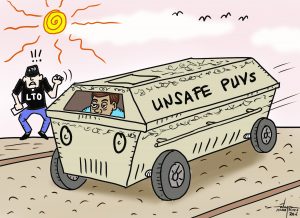The Alyansa ng Bagong Pilipinas’ decision to hold its proclamation rally in Carmen, Davao del Norte was a calculated and symbolic move.
While the Davao Region has often been branded as “Duterte country” due to the stronghold of the Duterte family in Davao City, the political dynamics of the surrounding provinces paint a different picture.
Historically, Davao del Norte and the rest of the Davao Region have been influenced by local political families with little to no deep-rooted allegiance to the Dutertes.

Davao del Norte, for instance, has long been the domain of the Floirendo family, alongside their allies—the del Rosarios and the Lagdameos. These clans have played pivotal roles in shaping the province’s political landscape.
Davao del Sur is largely influenced by the Bautista and Cagas families, while Davao de Oro is under the sway of the Uys and the Gonzagas. Meanwhile, Davao Oriental has remained firmly in the hands of the Rabats and the Malanyaons plus the Dayanghirangs.
The truth is, Davao City is the only area in the region where the Duterte family holds unquestionable sway.
The rest of the provinces are independent power bases that supported the Dutertes at certain points, but their loyalty lies primarily with their local leaders.
This reality makes Davao del Norte an excellent choice for the Alyansa ng Bagong Pilipinas’ proclamation rally.
Carmen, a municipality in Davao del Norte, is not just any town—it holds political significance.
During the 2022 presidential campaign, President Ferdinand Marcos Jr. also chose this very location to solidify his support in the region.
By returning to Carmen for the launch of Alyansa ng Bagong Pilipinas, the administration is sending a clear message: the Davao Region is not monopolized by a single political family, and the electorate is open to other political options, especially when endorsed by influential local leaders.
What’s more telling is that the crowd that gathered in Carmen did not come exclusively from Davao del Norte.
Thousands of supporters from across the entire Davao Region—Davao del Sur, Davao de Oro, and Davao Oriental—joined the rally.
This regional turnout signifies a broader base of support beyond city-centric politics. It also highlights the reality that voters in these provinces are not beholden to the Dutertes but to whoever their trusted local leaders tell them to support.
The Philippines’ political structure remains deeply rooted in local alliances.
Local political leaders wield significant influence over voter behavior, often delivering entire blocks of support to their chosen candidates.
In the Davao Region, the Floirendos, del Rosarios, Lagdameos, Uys, Gonzagas, and Rabats are still the dominant political forces capable of shaping election outcomes.
The presence of the Alyansa ng Bagong Pilipinas in Carmen is a recognition of this power dynamic. It acknowledges that capturing the hearts of Davao Region voters requires working with the local political elites, not relying on the residual influence of the Duterte brand alone.
The Alyansa ng Bagong Pilipinas’ strategy to engage voters in Davao del Norte and across the Davao Region reflects a broader understanding of regional politics.
By holding the proclamation rally in Carmen, the alliance is bridging its national platform with local political realities. It is also a reminder that political loyalty in the region is fluid, driven more by local leadership than blind allegiance to any one political family.
In the end, the rally was not just a show of force; it was a statement of political pragmatism.
It proved that while the Duterte name still commands respect in Davao City, the rest of the Davao Region remains open, diverse, and led by local political titans who can make or break a candidate’s chances.
The Alyansa ng Bagong Pilipinas’ choice of Carmen was both a nod to history and a forward-looking move, one that underscores the importance of securing the trust of local leaders in winning the region.
It’s clear that in the Davao Region, voters listen to the voices they trust most—their local leaders.
And that’s why Carmen, Davao del Norte, remains a vital political battleground for national players seeking regional dominance. PR


